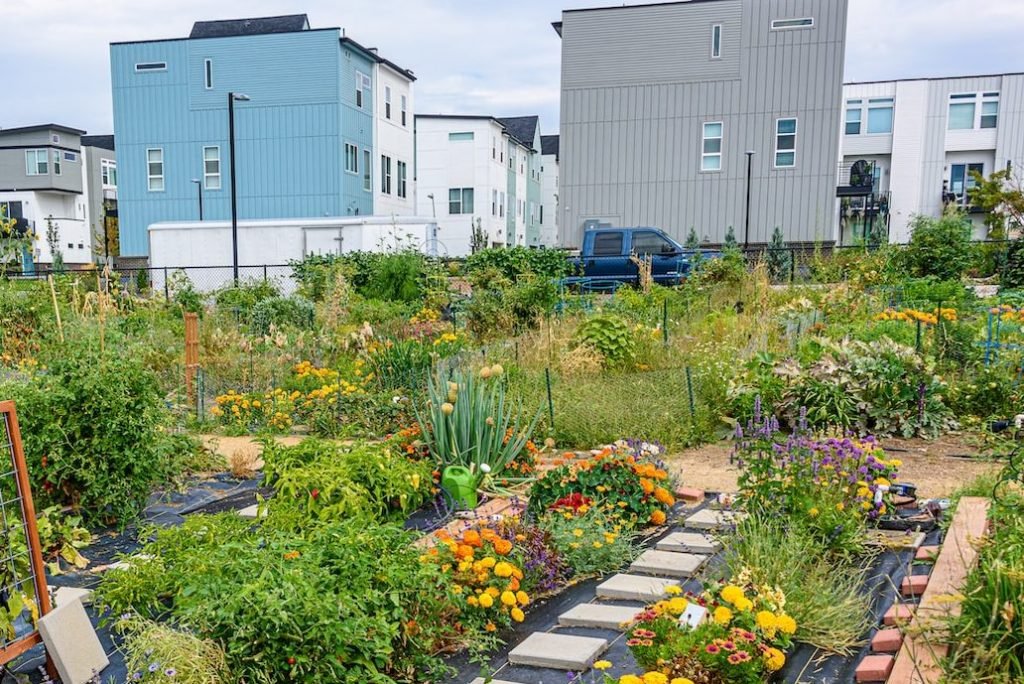
Interested in forming small-group alliances for resource sharing, perhaps even involving shared or swapped residential space? Discover the many ways to create a multi-house collective that’s tailored to your unique needs and preferences.
3
Types of resource-sharing & residence-sharing collaborations
Multi-house Local Collectives
Multi-house collectives represent a unique and less common form of intentional community. While similar to cohousing in offering private residential units alongside shared spaces, a key distinction is that the homes are not necessarily contiguous or even in the same neighborhood. Ownership of the residential units may or may not be collective. By selecting “multi-house collective” in an ICmatch profile, individuals can connect with others seeking partners for local resource sharing, with the potential for deeper residence sharing as trust develops. Shared spaces in such arrangements could include a ceramic studio, a mechanic shop, a hot tub or pool, a private library, a dedicated room for dance or exercise, or a space for specific entertainment or business purposes.
These collectives vary widely in their intensity and type of collaboration. Generally, they aim to provide comfortable shared access to living and working spaces. It is important to discuss ways of respecting each other’s private areas and seeking permission for entry.

Multi-house Dual-location Collectives
If intentional community can be thought of as a chosen family, then a multi-house dual-location collective expands this concept to a chosen extended family. These collaborations between households often form around a shared cause or common set of beliefs. Working on shared projects naturally requires group decision-making, which is a powerful way to build trust over time. When you have regular interactions centered on resource sharing, you’ll quickly discover what works best for each individual and for the group as a whole. This process can lead to deeper, long-term resource sharing. This could include sharing a vacation home or even inviting a member of another household to live with a community member who is closer to their work or school.
City-to-countryside Swap
A city-to-countryside swap could be the perfect arrangement for certain households, offering a refreshing change of pace and scenery. City dwellers with demanding jobs might find their hectic lives soothed by regularly escaping to nature and a quieter environment, whether weekly, monthly, or sporadically. Conversely, countryside homeowners could feel invigorated by regular trips to the city for cultural events, diverse culinary experiences, and other amenities.
While various platforms facilitate temporary stays in different areas, a regular swap with another household offers distinct advantages:
- Cost-free arrangement: You can organize swaps with a single partner household at no cost to either party.
- Convenience of dedicated storage: Establish dedicated storage spaces in each other’s homes, eliminating the need to pack and the risk of forgetting essential items.
- True integration: Instead of feeling like a transient visitor, you’ll have the opportunity to genuinely integrate into another neighborhood during your time at the alternate location.
Examples
Embassy Network: Intent on fostering “new forms of governance and solidarity,” this group connects its members with diverse communal living setups across various nations and city locations. This makes it an ideal option for digital nomads and others whose work involves frequent travel.
Junction Village: This intentional community reportedly originated when neighbors in a conventional housing development opted to dismantle their backyard fences. They transformed individual backyards into shared common spaces. As an extension of this innovative idea, your entire block could relocate backyard fences to front yards. This would create a secure and contained space for pets and children within the entire block.
Consultants for Multi-house Collectives
ICmatch can connect you with consultants who have deep experience in projects and living environments that thrive on close, sustained cooperation. These professionals are experts at guiding others through the unique opportunities and challenges of communal living.
The consultants listed below have subscribed to be featured on this page. For even more consultants with interest and expertise in this type of community, visit the consultants page linked in the header.
Members Interested in Multi-house Collectives
ICmatch can connect you with communitarians who have similar interests and values. The members listed below have subscribed to be featured on this page. For even more members with interest in this type of community, visit the Match for Free page linked in the header.
Resources
The sections below offer a wealth of links to diverse businesses, non-profits, and innovative ideas to support multi-house collectives, neighborhood mutual aid groups, and Transition Towns. These resources can help you tap into a wide array of local and non-local sharing economy initiatives, sparking ideas for the many types of resource-sharing you could establish within your own collective. While traditional community centers, service clubs, and churches have historically coordinated helping and connecting, these resources offer additional pathways.
- Platforms that map local groups: If your primary goal is finding partners for a neighborhood project, you can also explore our dedicated listing that includes mutual aid networks and community-building causes, such as the Transition Network.
- Green America: 10 ways to build community
If you’re ready for a larger undertaking, consider a neighborhood-level initiative with elements of the Transition Towns movement. You might join existing groups, such as a neighborhood watch, service club, or community garden. An excellent example of how a small project can grow into a vibrant community asset is a bike repair shop evolving into a true neighborhood hub.

Mutual Aid Networks
To increase community cohesiveness where you already live, start a resilience circle.
You might also search for local mutual aid networks. If there are none and you choose to start your own, you could advertise your meetings to new members thru the Nextdoor app, Meetup.com, or Eventbrite. See also the section on resilience circles.

Resilience Circles
Cultivating supportive social connections offers significant health benefits.
The world’s longest-lived people chose—or were born into—long-standing social circles. For example, Okinawans created groups called a moai (pronounced mow-eye). These groups of about five originally were assigned to each other as a social safety net, but many of them became committed friends for life. To increase the community cohesiveness where you already live, you might find that neighborhood resilience circles are a good way to develop relationships with people willing to support each other in hard times, both physically and emotionally. Set up a disaster preparedness plan as a pod.

Dinner Group
A rotating meal schedule among friends saves time and enriches relationships.
A great way to create more intentional neighborhoods is eating together. Create a rotating schedule of meals with neighbors or a friend group, to save time and enjoy more variety. You could eat in each other’s homes to enjoy the company. Alternatively, members could cook extra on certain nights and allow pickup, or deliver to the others’ homes.

Elder Support Groups
Aging family members eventually lose many of their friends due to death or inability to travel.
Creating a social support group to facilitate visits and activities could ease the loneliness many feel in their later years. You might find interested others on Facebook pages, by leaving notices with businesses or non-profits who serve the elderly, or thru Meetup.com.

Child Care
Single parents can team up to share living expenses and swap childcare.
- You might set up a childcare swap with other parents.
- If you are a single parent looking for another single parent to live with, you might set up profiles in both coAbode.org and ICmatch.
- Sites like care.com can help you locate vetted child care and tutoring. There are also sites that help you find live-in nannies.
- Make sure to think carefully about these questions:
How well should you know someone before leaving a child alone with them? What should you consider before leaving a child home alone?

Medical Risk Bubbles
Medically vulnerable people can stay safe and healthy while socially supported.
Pods, also called bubbles or quaranteams, helped people stay safe, healthy, socially supported, and sane amid the pandemic restrictions. Some continue to need to limit their exposure to various medical risks. As a group, be clear with each other about the level of personal risk that feels okay for you, depending on the vulnerability of your immediate household members. Set rules you all agree on. See our in-depth suggestions

Business Partnership or Work Project Teams
Revenue sharing and mutual support agreements for professionals.
- If you are interested in revenue sharing and mutual support agreements for professional teams, see Enspiral as an example of a work cooperative with innovative work team management and finance sharing. Sometimes when a business is up for sale, a group of employees has purchased it to continue operation as a coop. ICmatch could help you find long-term matches for a leadership team with specific skill sets and interests. You might also hire contractors from idealist.org or Upwork.
- The ReBuilding Center is an 80,000 square foot facility that makes recycled materials available for low cost. This workplace has a shared-power culture where they all earn a living wage, with full health and dental benefits for their families.

Minimize Cost of Living
Peer-to-peer services plus popular advisors on living within your means.
- Use the Food Not Bombs model of gathering and distributing barely-expired food that would otherwise end up in the landfill.
- If you don’t have thrift stores nearby to fill this need, host a clothes swap, a flea market, or a freebox. Teens can gain valuable experience and resume points from taking on responsibility for these projects. This alleviates the task load of overworked adults.
- Search for a local Repair Cafe to get help fixing items you might otherwise discard and re-purchase.
- A popular frugal lifestyle blogger in early retirement explains the importance of community in his family’s life.
- Dave Ramsey is another popular finance advisor who advocates for aggressively paying off debt thru strict budgeting.
- If you’re looking for the “Airbnb” of storage spaces to park your car or stuff while away, see neighbor.com.

Car Share
Forming a car share with friends or neighbors close by could be a great option.
- Member-owned car sharing co-operatives can be found in many metropolitan areas, where you pay per hour or per mile to “borrow” a car from the service. In addition, there are websites that organize carpools for regular commutes.
- Lyft, Uber, and similar pay-per-use services are great for infrequent needs and for travel while away from your home area.
- If you are looking to keep the benefits of vehicle use with less cost, or if you aren’t in a metropolitan area where carshares or good public transportation are located, forming a car share with friends or neighbors close by could be a great option, especially when each household has a vehicle and only occasionally needs a second one.

Time Banks and Local Currency
Time banks can track your contributions to allow you to swap services locally.
To see if these services exist locally, use search terms such as “time bank” or “local currency” along with your location. On a related note, bartering websites such as freecycle.org or classified ads can lead you to a trove of resources, often for free.

Sharable Housing
Cohousing and coliving options have increased the affordable housing supply.
Our Rental Housing Search Tips page lists many options for sharable housing.





